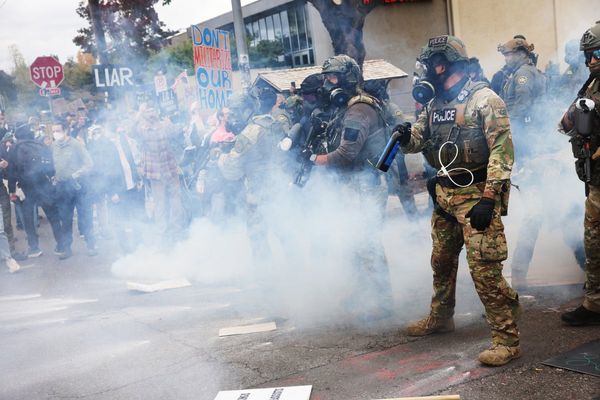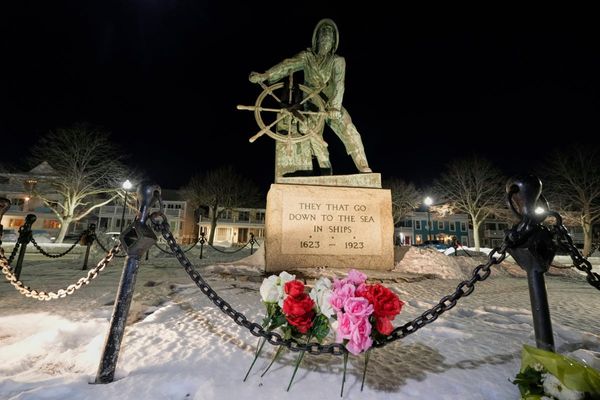What is gerrymandering? And how much is too much?
Attorneys defending the new Republican-drawn congressional map in Wyandotte County District Court said Wednesday that a group of voters challenging the boundaries hadn't provided standards to answer those questions.
The attorneys also called two witnesses who criticized reports produced by experts on behalf of the voters. The issue was how much credit to give analyses that found the new map is a mathematical outlier that dilutes the voting power of minority and Democratic voters.
That was the essence of the defense's case, after the first two days of the trial centered on testimony for plaintiff witnesses. It represented the state's last major effort to convince District Court Judge Bill Klapper to rule that the Legislature didn't violate the state constitution when it approved the map over Gov. Laura Kelly's veto earlier this year.
"We have no guidance of what constitutes racial gerrymandering in Kansas," Anthony Rupp, an attorney representing the state, said.
The case is destined for the Kansas Supreme Court, regardless of how Klapper rules. The final decision will mark a historic moment in state history — the first time the state's highest court will rule on congressional gerrymandering. It could shape how lawmakers draw lines for decades to come.
The disputed map divides Wyandotte County, the state's most racially and ethnically diverse county, between the 2nd District, held by Republican Rep. Jake LaTurner, and the 3rd District, held by Democratic Rep. Sharice Davids. It also sweeps liberal-leaning Lawrence into the the solidly-Republican 1st — a massive district that extends across the western and northcentral areas of the state.
The voters challenging the map say it violates state constitutional protections of equal rights, suffrage and free speech. Their attorneys have said those protections are more robust than the rights offered under the U.S. Constitution — a key argument given that federal courts have stopped reviewing maps for political gerrymandering.
The trial itself appears headed toward a quiet ending. One more witness will testify when court reconvenes on Monday, but all sides have indicated they plan to waive closing statements.
After attorneys for the voters rested their case around midday, Rupp moved for a ruling in the defendants' favor — a common tactic at trial that attempts to get the case tossed before the defense offers its case. Klapper denied the motion, but not before hearing arguments, providing the closest thing to closing statements that will likely be made.
Attorneys for the plaintiffs, which include voters from Douglas, Wyandotte and Johnson counties, argued the state was attempting to assert that there are no rules under Kansas law when it comes to redistricting and that the Legislature has limitless power.
"The Legislature simply can't be allowed to act in a completely unfettered fashion," Mark Johnson, an attorney representing some plaintiffs, said.
Stanton Jones, another plaintiffs attorney, said that "racial justice for minority voters in Wyandotte County hangs in the balance."
The state argued the plaintiffs hadn't offered a burden of proof for the government to meet or standards that Klapper should rely on. They cautioned the judge — a single member of the judicial branch — against throwing out the actions of the Legislature, an entire branch of government.
The law cannot be that a map is unconstitutional because a district is made "a little" more Republican than it was before, they argued.
And they sought to argue Klapper should place little weight on the plaintiff's expert witnesses, which included a University of Michigan professor who programmed a computer to draw 1,000 simulated maps to show the Kansas map is extremely abnormal.
The decision "surely cannot turn on algorithms written by plaintiffs' expert," Rupp said.
"There is no law in regards to racial gerrymandering," he added a short time later, referencing Kansas law (federal law prohibits racial gerrymandering).
In ruling against the defense motion, Klapper acknowledged the state had raised "compelling arguments," including the absence of standards to be considered. But he said in each of the analyses offered by the plaintiffs' experts, "there was overwhelming evidence the Kansas Legislature engaged in" gerrymandering.
As to the contention that the Legislature can redistrict however they want to with no oversight, Klapper said, "folks, that's not what government is all about."
The trial appears likely to conclude without any testimony of from Republican lawmakers involved in drafting the map, meaning that the details of its creation — who originally drew it and when — probably won't emerge in court.
The plaintiffs subpoenaed several GOP lawmakers, but the Kansas Constitution shields legislators from civil process during the session, essentially allowing them to opt out of testifying.
"We had subpoenas for the maps that I think have been squashed," House Speaker Ron Ryckman, an Olathe Republican, said.
Among the last witnesses to testify for the plaintiffs was Lauren Sullivan, a Lawrence resident who votes Democratic. She spoke about how few similarities Lawrence shares with the region that encompasses the 1st District. Farms are smaller in Lawrence, Sullivan said, with few if any gas and oil wells, no refineries and no feed lots.
The testimony was part of an effort to prove the harm Lawrence residents would experience from the move. "There isn't much of a relationship between Lawrence and the current 1st Congressional District," Douglas County Commissioner Shannon Portillo testified Tuesday.
The defense witnesses called Wednesday didn't offer independent analysis of the map — a fact repeatedly pointed out by plaintiff attorneys — but instead offered critiques of expert reports produced by the plaintiff's witnesses.
Alan Miller, a professor of law and economics at Western University in Ontario, argued the efficiency gap — an element of the expert testimony put forward by the plaintiffs — is a bad way to measure gerrymandering in congressional districts. The efficiency gap is a formula that tries to quantify gerrymandering by figuring out how many votes in a particular election are "wasted," which includes the number of votes for losing candidates and the number of votes for the winning candidate above what's required to win. Kansas's efficiency gap would increase under the new map.
"The efficiency gap is not a good definition of gerrymandering by any reasonable definition of gerrymandering," said Miller, who co-authored a 2017 article purporting to point out flaws in the efficiency gap.
During cross-examination, Miller acknowledged the article — his only one on the efficiency gap — wasn't peer-reviewed. Plaintiffs' attorneys also displayed Miller's invoice to the defendants for nearly $51,000 for less than a month of work.
"I worked some very long days," Miller said.
____
(The Star's Katie Bernard contributed reporting.)







